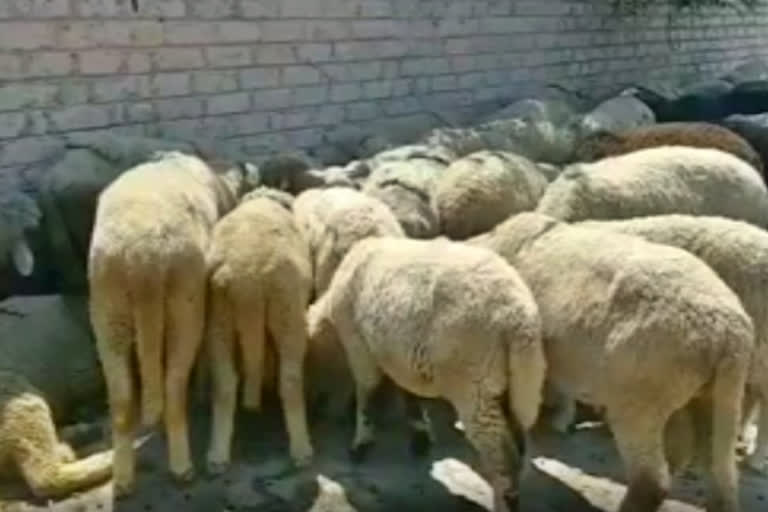Srinagar: With less than a week left for Eid al-Adha, the Jammu and Kashmir administration on Saturday clarified that the communique over the slaughter of bovine animals has been “misunderstood” and that there is no ban imposed on the sacrifice of animals.
Despite the clarification from the administration, confusion prevails in the backdrop of a century-old law that banned the slaughter of bovine animals in Jammu and Kashmir and implementation of rules and rights under animal cruelty and welfare rules.
Yesterday, the Department of Animal and Sheep Husbandry and Fisheries issued a communique to the civil and police administration citing an official letter bearing No: 9-2/2019-20/PCA dated June 6, 2021, it had from the Animal Welfare Board of India, Ministry of Fisheries, Animal Husbandry and Dairying.
“Large numbers of sacrificial animals are likely to be slaughtered in the UT of J&K during Bakra Eid festival scheduled from 21-23 July 2021 and the Animal Welfare Board of India, in view of animal welfare has requested for implementation of all precautionary measures to strictly implement the Animal Welfare Laws,” the communique read.
The administration was urged to take “all preventive measures” as per the provisions of Acts and rules to stop the “illegal killing of animals” and to take “stringent action” against the offenders violating animal welfare laws.
Also read: J-K officials seek ban on illegal killing of cows, camels during festivals
The letter was considered as an official communication putting a ban on sacrificing bovine and camels ahead of Eid-ul-Adha or Eid Qurbaan to be celebrated in Kashmir on July 21-22. The letter created a furore as critics turned to social media to denounce the alleged move.
Javed Ahmed Ganai, a Srinagar resident, has been selling sacrificial animals for over 25 years.
"I used to get stock from Uttarakhand, Rajasthan and other parts of the country every year ahead of Eid. But this year they have created a lot of confusion," Ganai told ETV Bharat.
"I was selling sacrificial animals at the rate fixed by the administration. When yesterday I got to know there is a ban on slaughter of bovine animals, I got worried that my business will take another hit this year too," he added.
Ganai says he received several calls from customers who wanted to return the animals.
"They (customers) were calling for refund and return of animals as they feared backlash from the administration. I even had to offer discounts to interested buyers," he said, adding, "today I am hearing there is no ban but still confusion is there. Buyers are not coming forward now as it used to be before."
Religious bodies, meanwhile, too termed the administration's move as “arbitrary” and an infringement of religious obligations.
Mirwaiz Moulvi Umar Farooq-led Muttahida Majlis-e-Ulema (MMU), an amalgam of nearly a dozen religious groups, said the move was “discriminatory”.
“It surprising that sacrifice of bovine animals on the religious occasion of Eid is being termed illegal and disallowed under the garb of prevention of cruelty to animals Act,” an MMU statement read.
Today, the Principal Secretary Animal and Sheep Husbandry, Naveen Kumar Choudhary, however, clarified that “no ban” has been imposed on sacrificing of bovine animals on Eid but added that the slaughtering should be “done as per animal laws.”
Also read: JK: Prices of sacrificial animals hit the roof
“It is just an advisory, not a ban order and has been issued by the animal welfare board asking the concerned to comply with animal laws and the same has been forwarded by the director planning,” Choudhary said.
A senior lawyer of the High Court of Jammu and Kashmir and Ladakh asserted that the administration must be clear and transparent while issuing advisories regarding religious matters.
“The letter created confusion because of the way it was drafted. When was the last time a camel was sacrificed in Kashmir? It's extremely rare in UT. Bovine slaughter too not common here and that is because of the laws once applicable in the region under the erstwhile Ranbir Penal Code (RPC),” the lawyer said requesting anonymity.
Explaining the laws regarding bovine slaughter, he said, " these laws date back to 1930s. They were the most stringent in the country that could lead to 10 years of imprisonment for offenders. However, the law ended with the abrogation of Article 370."



